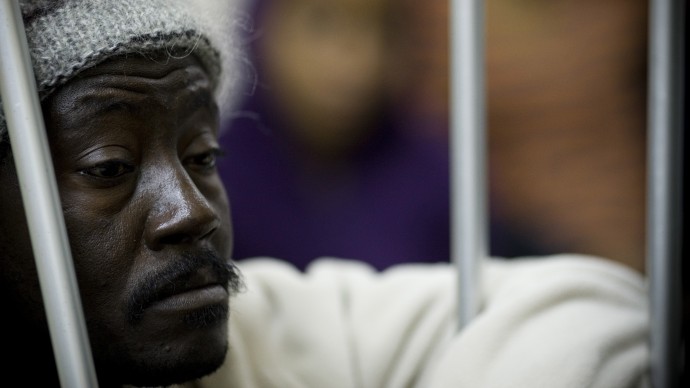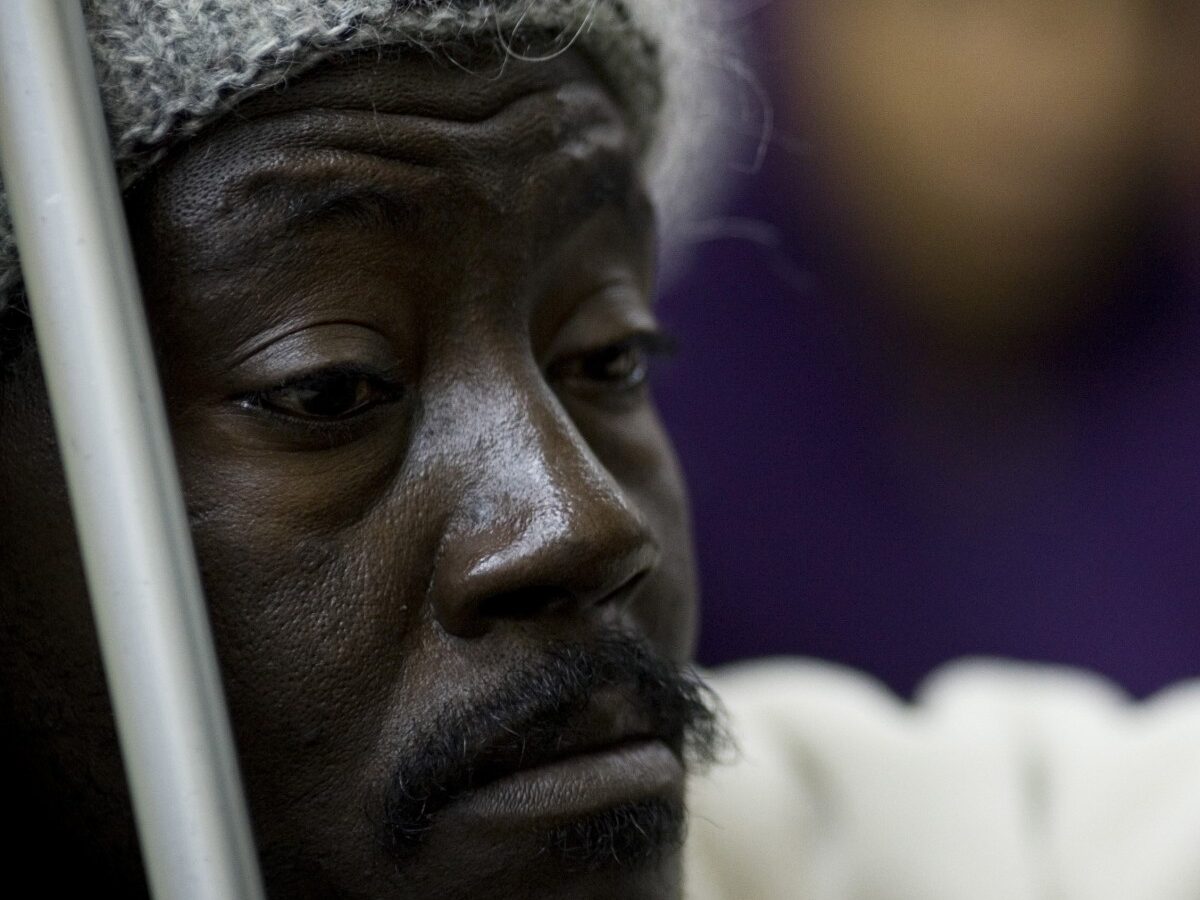
(NAMIBIA) MintPress – Many Eritrean asylum seekers who survive kidnapping and torture in Sinai are now being held in Israeli prisons for up to three years, according to a new report by the Hotline for Migrant Workers and Physicians for Human Rights – Israel (PHR-I).
According to the report released last month, an amendment to the Israeli Anti-Infiltration law allows for refugees, including those believed to be victims of torture, to be held for three years in detention without trial or charges brought against them. According to NGO estimates, between 5,000 and 7,000 torture survivors currently reside in Israel without social rights or assistance.
The report states, «The asylum seekers who survive the torture camps, do not get shot by Egyptian soldiers on the border, and manage to get into Israel despite the new fence and the renewed practice of refoulement, are taken to Saharonim prison. In the prison, near the Nitzana checkpoint on the Egyptian border, they are detained in two-story buildings in some of the sections and in cloth tents in other sections. Women and children are always detained in the same section, in tents.»
Nearly 2,500 asylum seekers are currently being held in internment camps along the Egyptian-Israeli border — the overwhelming majority is Eritreans. After construction is completed by the end of November, the two prison facilities will be able to hold 9,000 detainees.
Discrepancies in distinguishing between torture and non-torture victims
Since 2009, thousands of Eritreans have been kidnapped, tortured and held for ransom in Sinai on their way to seek asylum. Many of these asylum seekers are reluctant to share their experiences of torture upon arrival in Israel.
Out of 1,543 asylum seekers detained under Israeli Anti-Infiltration law while entering through Sinai between June and September, only 30 reported torture experiences convincing enough to demand further examination by the Israeli Administrative Tribunal.
During 2011, 54 women reported previous sexual assault to Israeli authorities; 23 women actually received gynecological treatment. In the same year, 1,585 women were sent to PHR-I to receive gynecological treatment, 21 of whom underwent abortions.
The number of torture victims sitting in Israeli detention is believed to be much higher than the 30 reported cases. According to the report, asylum seekers are discouraged from sharing their torture experiences with Israeli judges and officials due to the uninviting circumstances under which they are held.
In July, the UNHCR identified five torture and slavery survivors in one visit to Saharonim prison that chose not to report their experiences with Border Control or Administrative Tribunal officers.
According to Israeli law, Eritreans who ask for asylum or legal status at the border and do not receive a reply within three months or a final answer within nine months, may be released from custody. The Hotline for Migrant Workers claims Israeli officials circumvent these provisions by not accepting requests or not providing asylum seekers the means to actually ask for asylum at all.
Since becoming a signatory to the Refugee Convention in 1951, Israel has only recognized 157 asylum seekers as refugees. Sixty-three percent of asylum seekers residing in Israel originated in Eritrea. The average recognition rate of Eritrean asylum seekers as refugees worldwide is 84.5 percent.
According to the UNHCR, the Israeli government rejected 3,692 new asylum applications and granted one family refugee status out of 4,603 applications submitted in 2011. Israel refuses to grant refugee status to many Eritreans who have been living in Israel for roughly two decades.
Even if an Eritrean asylum seeker is able to convey experiences of torture with the help of the single Tigrinya-speaking social worker in the detention facilities, Israeli definitions of “human trafficking” and “slavery” are much narrower than in other parts of the world. There is no special treatment for survivors who are deemed as “only” torture victims, and Israeli authorities are yet to develop a formal identification system for victims of cruel, inhuman or degrading treatment.
If asylum seekers do not exhibit clear signs of abuse, they must wait in detention until it can be determined whether “preliminary evidence” suggests that a person is a victim of human trafficking or slavery.
«The use of detention as part of the refugee status examination process has an unquestionable negative impact on the mental and physical state of the asylum seekers,” claim the Hotline for Migrant Workers and PHR-I. “Sometimes this impact is irreversible and the damage to the health of the asylum seeker cannot be undone.»
Resistance to Anti-Infiltration law
The amendment of Israel’s Anti-Infiltration law in January of this year was seen by national and international observers as the cornerstone of a broader anti-refugee movement. Eyal Yinon, the Knesset’s legal adviser, opposed the law, stating it does not meet “minimal constitutional standards.”
Originally intended to block the entrance of Palestinian infiltrators conducting sabotage operations in 1954, the law now applies to all persons entering Israel without a permit regardless of whether the country is in a state of emergency.
According to Yinon, applying the 1954 law to African refugees “poses difficult legal problems” and “it is impossible to detain people for an unlimited amount of time.” Under the law, those entering from enemy states, like Sudan, may be detained indefinitely past the three year limit.
“The Anti-Infiltration law punishes extremely vulnerable people for their attempt to flee to safety in Israel,” says Bill Frelick, refugee program director at Human Rights Watch. “Israel should not treat asylum seekers as criminals or subject them to harsh penalties.”
According to Frelick, “Israeli officials are not only adding rhetorical fuel to the xenophobic fire, but they now have a new law that punishes refugees in violation of international law. The law should be amended immediately, and not enforced until necessary revisions are made.”
“We cannot agree with a policy that determines that prison is the place for innocent victims who survived torture, captivity, rape and serious abuse,” said Shahar Shoham, project director of PHR-I’s Department of Migrants and Persons with No Civil Status. “Instead of offering aid and refuge to those seeking protection, the State of Israel chooses again and again to use dark practices whose declared aim is to make people who want to live, despise life.”
Haaretz reported that Attorney Reut Michaeli, director of the Hotline for Migrant Workers, said, “The policy is evidence of totally losing one’s way, and of the creation of a hierarchy of suffering – of this one being released while the other stays in jail, based on the level of torture they underwent. The price of the lack of treatment will be paid by the victims and Israeli society alike.
“Israel must immediately establish a procedure for identifying and treating victims of torture, both in the prison and outside it… Similarly, Israel must allow the entry of all asylum-seekers, particularly those who were torture victims, and evaluate their request for asylum,” Michaeli added.
Asylum seekers forced back to Sinai, under threat of continued torture
Since the Anti-Infiltration law was amended, the number of asylum seekers entering through Sinai has declined. In the past few months, only asylum seekers who present visible signs of torture have been able to enter Israel successfully. Many Eritrean asylum seekers are forced back into Egypt by Israeli soldiers before even entering the country.
Human rights groups report that since June, the Israeli military has prevented dozens of asylum seekers, mostly Eritreans, from entering Israel through a newly constructed border fence with Egypt.
“Building a border fence does not give Israel a right to push back asylum seekers,” said Gerry Simpson, senior refugee researcher and advocate at Human Rights Watch. “International law is crystal clear: no summary rejection of asylum seekers at the frontier and no forcible return unless and until it is established that their refugee claims are not valid.”
Once returned to Egypt, many Sudanese and Eritrean refugees are then deported back to their home countries, where UNHCR and Amnesty International have reported grave human rights violations.
Between June and October, rights groups recorded at least eight groups of asylum seekers who were pushed back to Egypt by the Israeli Defense Forces (IDF). Asylum seekers pushed into Sinai are believed to be detained in severe conditions and are subjected to sexual abuse by the prison guards.
Some asylum seekers are even being held without food and very little water on Egyptian soil by IDF soldiers until Egyptian soldiers come to collect them. According to the Chief of the Southern Command Advocate, these asylum seekers remained on Egyptian soil and therefore were not “returned” there.
“Not only are there credible reports that Israeli soldiers are blocking asylum seekers at the border, but also that they are using violence to do so,” Simpson said in a statement to PHR-I. “Israeli authorities should immediately instruct its border patrols to stop abusing people who try to enter Israel.”
“Israel has the right to protect its borders, but it also bears an obligation to respect the Refugees Convention, and the Convention against Torture to which it is a signatory,” concludes the report by the Hotline and Migrant Workers and PHR-I.
The report recommends Israel strengthen its victim identification system to ensure compliance with international guidelines on torture in addition to providing access to basic services for asylum seekers in detention and in the community.


